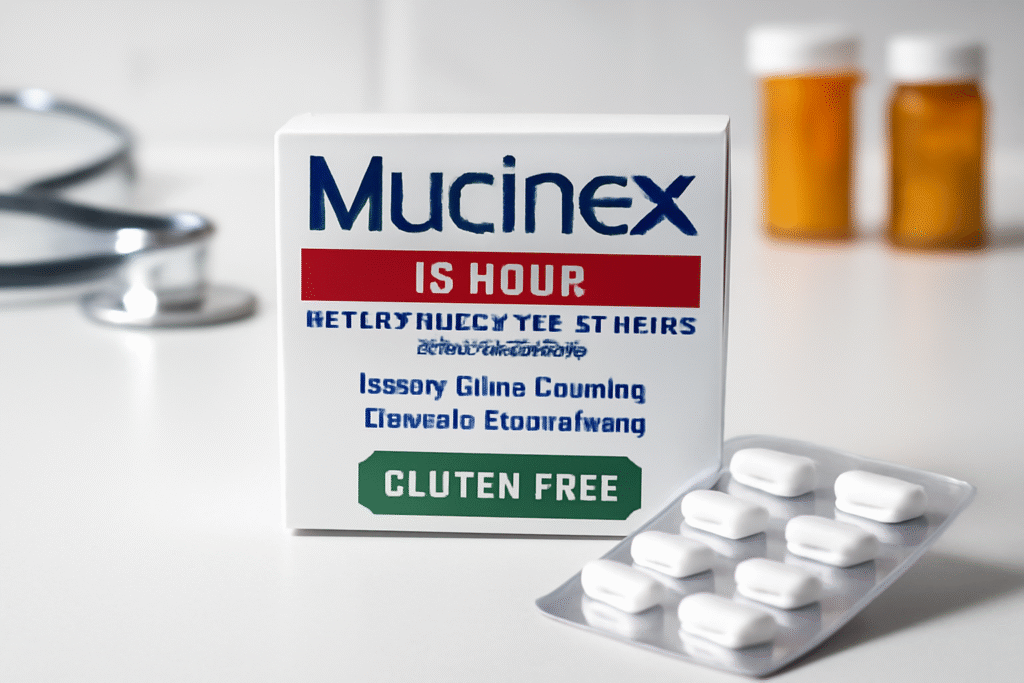When cold and flu season strikes, many people turn to Mucinex for relief. Yet, for those living with celiac disease or gluten sensitivity, a pressing question arises: Is Mucinex gluten free? This concern is far from trivial. A hidden source of gluten in medications can trigger painful symptoms, making it crucial to know what’s safe and what’s not.
Gluten sneaks into medications more often than most people realize. While food labeling laws require companies to disclose gluten-containing ingredients, the same strict rules don’t always apply to medicine. That’s why patients must dig deeper to understand whether their trusted remedies, like Mucinex, are truly safe.
Understanding Gluten in Medications
Gluten is a protein found in wheat, rye, and barley. While it’s best known for its role in bread and baked goods, gluten can also appear in medications. Manufacturers sometimes use starches derived from wheat as fillers, binders, or stabilizers in tablets and capsules.
For people without gluten intolerance, this may seem harmless. However, even trace amounts of gluten can cause serious health issues for those with celiac disease or gluten sensitivity. This makes the question of whether medicines like Mucinex are gluten free especially important.
Why People Ask Is Mucinex Gluten Free
The concern isn’t unfounded. Many medications do not list the source of their inactive ingredients. For example, “starch” could come from corn, potato, or wheat. Without clarification, patients are left guessing. Since Mucinex is a widely used medication for congestion and chest relief, people with celiac disease naturally want to confirm its safety.
Additionally, some cold and flu symptoms overlap with gluten-reaction symptoms, such as fatigue, headaches, and digestive distress. This makes it even harder to tell if a bad reaction comes from the illness itself or from gluten in the medicine.
Breaking Down Mucinex Ingredients
The primary active ingredient in Mucinex is guaifenesin, an expectorant that helps thin and loosen mucus in the airways. The inactive ingredients vary depending on the product type—whether tablets, liquids, or extended-release forms.
Inactive ingredients may include binders, coatings, dyes, and sweeteners. While none are listed as gluten by default, the risk lies in hidden starches that might be derived from wheat. Understanding this distinction is key to determining if Mucinex is safe for people with gluten-related disorders.
Is Mucinex Gluten Free According to Manufacturers?
According to Reckitt Benckiser, the maker of Mucinex, many of their products are considered gluten free. However, they also recommend patients verify with the company or check the most up-to-date product packaging, since formulations can change over time.
The FDA does not require drug manufacturers to label medications as gluten free. This means that while Mucinex may generally be safe, patients should still practice caution and confirm directly with pharmacists or the manufacturer.
Celiac Disease and Medications
For people with celiac disease, gluten triggers an autoimmune response that damages the small intestine. Even tiny amounts—sometimes less than 20 parts per million—can cause severe symptoms. Ingesting gluten accidentally through medication could lead to bloating, cramps, brain fog, or long-term intestinal damage.
Thus, the question of Is Mucinex gluten free? isn’t just about comfort; it’s about protecting long-term health.
Gluten Sensitivity and Cold Medicines
Non-celiac gluten sensitivity may not cause intestinal damage, but it can still result in discomfort, headaches, and fatigue. Cold medications containing gluten might worsen symptoms, leaving someone more miserable than before. Choosing gluten free medicines reduces this risk and provides peace of mind during recovery.
Forms of Mucinex and Their Gluten-Free Status
Mucinex comes in multiple forms:
-
Extended-release tablets
-
Liquids and syrups
-
Children’s Mucinex
-
Mucinex DM and Mucinex D (with decongestants)
Most reports suggest these are gluten free. However, since inactive ingredients can differ between formulas, checking each specific product is essential.
Are Generic Guaifenesin Products Gluten Free?
Many generic versions of guaifenesin are available, but not all may be gluten free. Manufacturers of generics often source inactive ingredients from different suppliers, making it harder to verify gluten content. While the active ingredient is safe, the fillers might not be. Always check with your pharmacist before switching from Mucinex to a store brand.
How to Verify If Medicine is Gluten Free
Patients can confirm gluten-free status through several steps:
-
Contacting the manufacturer directly
-
Asking a pharmacist to verify ingredients
-
Checking medical databases and celiac organization resources
-
Using gluten-free medication apps
Taking a proactive approach helps avoid unpleasant surprises.
Common Fillers in Medications
Inactive ingredients like starches, dextrins, and maltodextrins can sometimes come from wheat. Unless the source is specified, gluten-sensitive individuals must remain cautious. Corn-based or potato-based starches are typically safe, but wheat-based ones are problematic.
Pharmacists’ Role in Checking Gluten
Pharmacists play a vital role in verifying whether medications are gluten free. Since they have access to detailed ingredient databases, they can often confirm what manufacturers don’t publicly state. For patients with celiac disease, building a relationship with a trusted pharmacist can make all the difference.
Over-the-Counter Cold Medicines and Gluten
While Mucinex may be safe, other cold medications might not be. For instance, some popular brands of cough syrups and tablets may contain starches derived from wheat. This makes reading labels and checking with pharmacists a must for anyone sensitive to gluten.
Why Some Medicines Contain Gluten
Gluten may be used as a binding agent or to help with pill formation. In rare cases, it may even appear in flavoring agents. While pharmaceutical companies are increasingly aware of the demand for gluten free medications, not every manufacturer has adapted yet.
Symptoms of Gluten Exposure from Medications
If someone with celiac disease accidentally consumes gluten through medication, they may experience:
-
Abdominal pain
-
Bloating
-
Diarrhea or constipation
-
Fatigue
-
Joint pain
-
Brain fog
Recognizing these symptoms quickly helps in addressing potential gluten exposure.
Safe Alternatives to Mucinex
If patients prefer to avoid Mucinex or remain uncertain about its gluten-free status, alternatives include:
-
Robitussin (certain formulations are gluten free)
-
Hyland’s natural cold remedies
-
Plain saline nasal sprays
-
Herbal teas and honey
Always double-check each brand’s ingredient list before use.
Tips for Choosing Gluten Free Medicine
-
Look for a “gluten free” label on the packaging
-
Use apps such as Gluten Free Drugs
-
Consult your pharmacist before buying
-
Keep a list of trusted brands for future use
FDA and Gluten in Medications
Currently, the FDA does not mandate gluten labeling in drugs, though advocacy groups are pushing for stricter regulations. Until then, patients must remain vigilant in verifying medicines themselves.
Expert Opinions on Is Mucinex Gluten Free
Healthcare professionals generally agree that Mucinex is gluten free, but they stress the importance of checking packaging and staying informed. Dietitians and pharmacists often advise patients to call manufacturers when in doubt.
Personal Stories of Patients
Many individuals with celiac disease have safely used Mucinex without issue. However, a few have reported uncertainty and chosen alternatives for peace of mind. These stories highlight the importance of individualized approaches.
How to Talk to Your Doctor About Medicine and Gluten
When prescribed a new medication, patients should ask:
-
Does this contain gluten?
-
Are there gluten free alternatives?
-
Can I safely switch brands if needed?
Doctors can help navigate treatment without risking gluten exposure.
Mucinex and Kids with Gluten Intolerance
Children with celiac disease require extra caution. While Mucinex products for kids are generally gluten free, parents should always confirm before giving medication to their child. Small bodies can react more strongly to hidden gluten.
Myths About Gluten in Medicine
-
Myth: All medicines contain gluten.
-
Myth: Gluten in small amounts won’t hurt.
-
Myth: If food is gluten free, medicine must be too.
Debunking these myths helps patients make better choices.
Practical Checklist for Safe Cold Medicine
-
Verify ingredients with the manufacturer
-
Consult your pharmacist
-
Keep a list of safe brands
-
Watch for gluten-related symptoms after taking medicine
Final Verdict: Is Mucinex Gluten Free?
Based on manufacturer information and expert opinions, Mucinex is generally considered gluten free. However, since formulas may change and labeling is inconsistent, patients with celiac disease or gluten sensitivity should always confirm before use. When in doubt, consult your pharmacist for safe guidance.
Also read :Incident IO Revenue Growth 2025: Insights, Projections, and Future Outlook
FAQs
Is Mucinex safe for people with celiac disease?
Yes, most Mucinex products are gluten free, but verify each formula to be certain.
Can Mucinex tablets contain hidden gluten?
Unlikely, but inactive ingredients should be confirmed with the manufacturer.
Is Mucinex liquid gluten free?
Yes, the liquid formulations are typically gluten free, but check labels for changes.
Do generic versions of Mucinex contain gluten?
Some may, depending on fillers used. Always ask a pharmacist before switching.
How do I confirm if my medicine is gluten free?
Call the manufacturer, ask a pharmacist, or check reputable medical resources.
What should I do if I react to Mucinex?
Stop taking it and consult your doctor immediately. You may need an alternative.
Conclusion
The question Is Mucinex gluten free? matters deeply for anyone managing celiac disease or gluten sensitivity. While most Mucinex products appear safe, confirming directly with the manufacturer or your pharmacist remains the best practice. With awareness and proactive care, you can manage cold and flu symptoms without risking gluten exposure.



